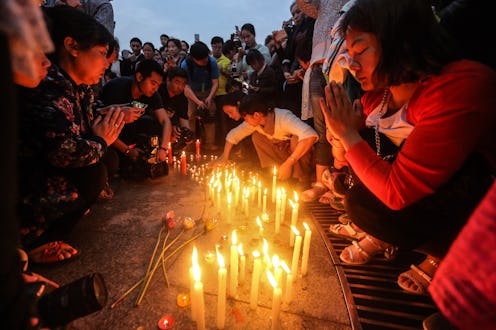News
Chinese Cruise Ship Death Toll Raised To Over 300
Chinese authorities on Friday announced that recovery workers had pulled an additional 228 bodies from the water logged Eastern Star cruise ship, bringing the death toll to over 300, reported state news agency Xinhua. The ship first capsized on Monday evening in the Yangtze River near Hubei province in eastern China. Officials are still unsure of what caused the ship, which was carrying 456 passengers, to sink in the first place, despite initial reports of bad weather affecting steering.
The Easter Star was put upright once again on Friday morning, having been submerged upside down for nearly a week. According to family and friends of the victims aboard, the Chinese government had not done enough to rescue potential survivors following the initial sinking.
"Is it necessary to treat the common people, one by one, as if you are facing some kind of formidable foe?" asked Xia Yunchen, 70, whose sister and brother-in-law were aboard the ship, after a news briefing with senior government response officials on Friday. "You are here to serve us, you need to be humane," she added, as security guards ushered her from the room.
According to Reuters, the Communist Party's Politburo Standing Committee — China's top leadership council — had already issued local government security forces to assist victims' families, though some have argued that it was more a show of force to keep grieving loved ones from rioting than anything else, given that their official announcement asked local police to "earnestly safeguard social stability" first and foremost.
So far, the capsizing has been attributed to high winds in rough weather, specifically a tornado that caused the ship to keel. But questions over a last-minute change of course and a seeming refusal to anchor or dock the ship when conditions worsened prompted authorities to take the captain and first engineer into police custody, the AP reported.
Anonymous sources speaking with The New York Times indicated that the level of transparency in the investigation was being kept murky and that relatives of victims had allegedly been trailed by government officials in order to ensure they didn't speak to the press. Foreign journalists were also barred from speaking to the 14 survivors rescued earlier this week.
"Some foreign media outlets are eager to take advantage of the relatives’ agony and rub salt into their wounds, creating confrontations between people at the center of the event and those at the periphery," wrote The Global Times, a communist state newspaper, in an editorial this week explaining the hold up. "This is really unkind."
Images: Twitter (2)
